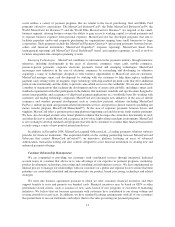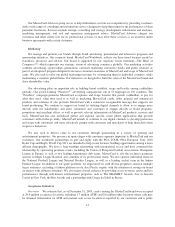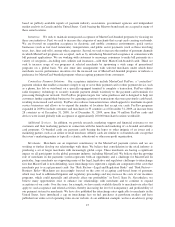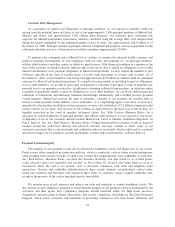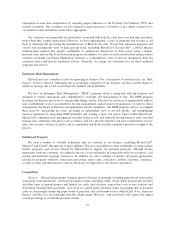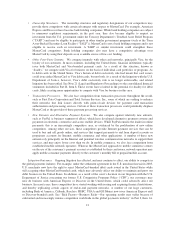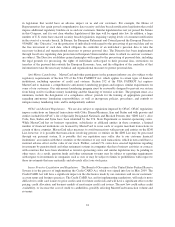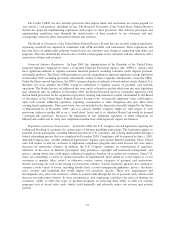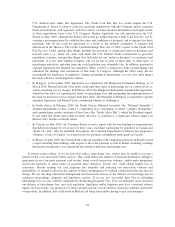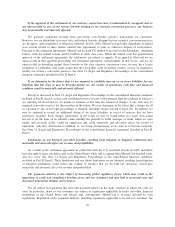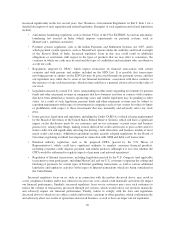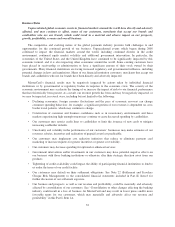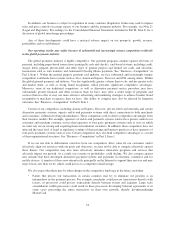MasterCard 2009 Annual Report Download - page 33
Download and view the complete annual report
Please find page 33 of the 2009 MasterCard annual report below. You can navigate through the pages in the report by either clicking on the pages listed below, or by using the keyword search tool below to find specific information within the annual report.• the impact of consolidation in the banking industry;
• new market entrants; and
• the ability to develop and implement competitive new card programs, systems and technologies in both
physical and virtual environments.
Government Regulation
General. Government regulation impacts key aspects of our business. We are subject to regulations that
affect the payment industry in the many countries in which our cards are used. Regulation of the payments
industry has increased significantly in the last several years. In particular, interchange fees associated with four-
party payment systems like ours are being reviewed or challenged in various jurisdictions, including in the
European Union and Hungary (discussed below).
Furthermore, MasterCard customers are subject to numerous regulations applicable to banks and other
financial institutions in the United States and elsewhere, and as a consequence MasterCard is impacted by such
regulations. Certain of our operations are periodically reviewed by the U.S. Federal Financial Institutions
Examination Council (“FFIEC”) under its authority to examine financial institutions’ technology service
providers. Examinations by the FFIEC cover areas such as data integrity and data security. In recent years, the
U.S. federal banking regulators have adopted a series of regulatory measures affecting credit card payment terms
and requiring more conservative accounting, greater risk management and in some cases higher capital
requirements for bank credit card activities, particularly in the case of banks that focus on subprime cardholders.
In addition, MasterCard Europe operates a retail payment system in Europe and is subject to oversight by the
National Bank of Belgium pursuant to standards published by the European Central Bank that are principally
targeted at managing financial, legal and operations risk.
In addition, aspects of our operations or business are subject to privacy regulation in the United States, the
European Union and elsewhere, as well as regulations imposed by the U.S. Treasury’s Office of Foreign Assets
Control (“OFAC”). For example, in the United States, we and our customers are respectively subject to Federal
Trade Commission and federal banking agency information safeguarding requirements under the Gramm-Leach-
Bliley Act. The Federal Trade Commission’s information safeguarding rules require us to develop, implement
and maintain a written, comprehensive information security program containing safeguards that are appropriate
for our size and complexity, the nature and scope of our activities, and the sensitivity of any customer
information at issue. Our customers in the United States are subject to similar requirements under the guidelines
issued by the federal banking agencies. As part of their compliance with the requirements, each of our U.S.
customers is expected to have a program in place for responding to unauthorized access to, or use of, customer
information that could result in substantial harm or inconvenience to customers.
Interchange. Interchange fees associated with four-party payment systems like ours are being reviewed or
challenged in various jurisdictions. Such challenges include regulatory proceedings in the European Union (by
the European Commission, as well as such European Union member states as Hungary) and elsewhere, and
regulatory inquiries in the United States and other jurisdictions. Interchange fees have also become the topic of
increased legislative interest. For example, in the United States, legislation has been introduced seeking to
regulate interchange by allowing merchants to collectively seek to lower their payment card acceptance costs.
See “Risk Factors—Legal and Regulatory Risks—Interchange fees are subject to increasingly intense legal,
regulatory and legislative scrutiny worldwide, which may have a material adverse impact on our revenue, our
prospects for future growth and our overall business, financial condition and results of operations” in Part I,
Item 1A and in Note 21 (Legal and Regulatory Proceedings) to the consolidated financial statements included in
Part II, Item 8.
Data Protection and Information Security. In the United States, during the past several years, a number of
bills have been considered by Congress and there have been several congressional hearings to address
information safeguarding and data breach issues. Congress continues to consider these issues, which could result
23


